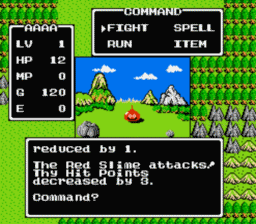And as long as I’m asking, here’s the second question I’d like people’s opinions on. Does 2nd-person narration (or first-person perspective, if you like – it’s the same thing) interfere with emotional involvement? If this kind of game really is, per Bakhtin, more dreamlike, a lack of emotional involvement would kind of stand to reason. I rarely remember my dreams. When I do, I don’t remember them for long. And the handful of dreams that have shambled over into my long term memory have no emotional resonance at all, even when they’re about things that are notionally “emotional,” like death and bereavement. Contrariwise, the slightest, most commercial, most debased little scraps of narrative can provoke a powerful emotional response in me, such as that one episode of Garfield and Friends where he thinks that they’re going to put Odie to sleep and he sings him this little song as they’re taking him away, and I – just – give me a minute, I’ve got something in my eye.
The emotions that dreams do inspire tend to be lizard-brain stuff like fear and lust, and when the dream’s over, they go away. This again is consistent with my experience playing games like Zork. Sure, in the moment, I may find myself afraid of being eaten by a grue, but it doesn’t linger. And even then, the fear wasn’t so much fear of the grue as it was fear of losing the game, because I hadn’t saved and I was damned if I was going to start all the way over from Outside of the House AGAIN. Now compare this to a “graphic adventure” game like King’s Quest III. Functionally, these games are almost identical to games like Zork – you still have to type stuff like “jump” and “look at cat,” but unlike the earlier games you can see the character that you’re controlling. And whether it’s because of this or just a coincidence, you begin to feel something for the character as well. Death here isn’t just frustrating, it’s actually just a tiiiiiiny bit sad.

Mind you, it's not like death in Kings Quest III is NOT frustrating. This particular death frustrated me about fifteen-bajillion times. By the way, click the pic for great hilarity.
Let’s look at another example: Final Fantasy vs. Dragon Warrior. These are two of the most venerable and wildly successful console RPGs available. Each series has its defenders, but there’s probably not a lot to distinguish between them as gameplay experiences. One fundamental difference between them, though, is that Final Fantasy has always presented a side view of the combat, using crude animation to show you the results of your commands, while Dragon Warrior always presents the combat through the characters eyes. Seems like a paltry thing… but even back when I played video games, I never got all the way through a Dragon Warrior title.* And I think it’s because I didn’t care about the characters. The implication is that I did care about my Final Fantasy I characters, which seems ludicrous since – remember, I did most of my video gaming back in the 8-bit era – and no, I’m not that old, I was just behind the times – they never at any time do or say anything other than stab monsters and occasionally put on a new shirt.
But I really did care! Actually, I made them lead rich internal lives… They even had little alliances: at one point I decided that two of the characters were friends, and made them protect and heal eachother at the expense of the rest of the party. Plus I was convinced that if I didn’t spend equal amounts of money on each character’s equipment, the random number generator would punish me by blowing all the attack rolls.
On closer examination, this looks less like a rich internal life and more like incipient obsessive-compulsive disorder on the part of the player… but hey, we’re talking about a first-generation CRPG here. Sometimes you had to make your own fun.
Anyway, this kind of imaginative fantasy is not possible in a game like Dragon Warrior where you usually can’t see the character. By the same token, I never managed to summon up the appropriate sadness when, playing Oregon Trail, that any of my children had died of CHOLERA or SNAKEBITE. Might this be because I never actually saw them? (Not even on their birthdays! I was a horrible virtual father.)
Of course, it there are going to be exceptions. The second most dreamlike game I ever experienced is third-person, so that’s one strike. The most dreamlike of all is Myst, though, so the theory’s got some legs, at least. At the very least, it’s worth thinking about. Again, I turn it over to you. Can 2nd-person narration ever have the same emotional punch as 3rd-person? Are there things you can get out of 2nd-person that you can’t achieve in 3rd-person? Is bringing up Bakhtin, and the whole question of dreams vis-a-vis narrative, really even helpful? Sound off in the comments!
* By the way, when I say that I don’t really play video games anymore, it’s not because I think I’m too cool. I don’t play video games anymore for the same reason that alcoholics don’t hang around in bars. So yeah, video games are a surprisingly deep source of enjoyment, and an important aspect of modern pop culture, and many responsible adults make room for them in their lives. The same is true of gin.


Another interesting question: is there a difference between sidescrollers like Mario and quasi-first-person control schemes like in, e.g., Grand Theft Auto III?
I’d say probably one if the the best ways to compare the second- and third-person narration would be to look at the Fallout games. In Fallout 1 & 2, the story is told from an isometric 3rd-person point of view, whereas 3 attempts to immerse the player from a 1st person through-the-eyes viewpoint. And I’d say that this does indeed result in a different level of emotional attachment to the characters, both your own and the NPCs who accompany you. And it feels to me to be the opposite of what the folks behind 3 wanted – I felt much less attached to my character or the NPCs. In 1 & 2, I’d feel genuine remorse if one of the NPCs,(especially Dogmeat) got gunned down in a fight, whereas in 3, it was much more of a “meh, they were mostly useless anyway” response. The emotional attachment I felt to the Vault Dweller or the Chosen One was considerably more deep than to the Wanderer of the Wastes.
I find that the 1st person perspective also has the interesting side effect of making the world feel far smaller than the isometric view, even though it is in reality quite a bit larger. So, there’s something else to consider.
I was going to spout off about how compelling Gordon Freeman (from Half-Life) is as a character, but then I realized that aside from his uncomfortably deep love of crowbars and the fact he is either the least properly utilized MIT scientist of all time, he’s a pretty bland character.
I suppose this is his point; he is the lens through which we see the world, and so it’s hard to care for him, because we associate “him” with “me,” and since we are aware that we’re playing a game and that there are no real risks for this character (after all, I can always quick-load the last save), it’s hard for me, the player, to care about what happens to Gordon.
However, that doesn’t mean you can’t care about other characters. HL2:Episode One’s goal was to create characters that the player would actually care about, and, at least for me, they succeeded. I was very sympathetic to Alyx in that game, especially since they did such a great job animating her movements and facial expressions.
Thus, I feel disassociated from the main character in an first-person game (moreso than 3rd-person games, anyway), but the supporting characters can still influence me.
This is an interesting article. One thing I think might be worth thinking about as well is the old convention of having a silent protagonist. The goal of this convention is to draw the player in and make them identify more with the main character, however I always felt that it just made me think the main character was boring, with more interesting secondary characters. This convention seems to be dying off however, maybe a case of “natural selection”?
I think it’s worth pointing out that a third person perspective in a video game still does feel to me quite a bit like a pseudo second-person narrative. Look at games like ICO and Shadow of the Colossus, those games’ stories were crafted in a minimal manner such that the motives of the character you were playing matched up uncannily well with the goals of the gameplay, creating an identification with your player character beyond what is possible in a novel.
I think it’s similar for most third person games; the fact that you’re making the character’s decisions for them keep it from feeling truly like a third person narrative.
Also Gordon Freeman feels like an excellent character somehow, even though he is just a set of background information and some pictures. I am still trying to figure that one out.
Until reading this I was unaware that other people apparently don’t often dream “in third person”, which I do constantly. It’s like I’m watching movies while I’m asleep, and rarely I’ll take over the role of whomever I was watching, or start as the character and then end up watching later, or strangest of all, move out of MYSELF to watch me in a dream like I’m someone else.
Granted, this may have to do with the wiring in my head since I have some major indicators of suffering from Dissociative Identity Disorder. (Been attempting to get a diagnosis for 4+ years, this is difficult without decent health coverage or the money to see the specialists that have been recommended, which my state health coverage wont pay for.)
Actually, Sillyweasel, I do all that too. I figured it was just because I play plenty of videogames :[]
@Sillyweasel and Josh: I don’t think it’s UN-common, although it may not necessarily be a totally prolific thing. I do it, as well, and I know of other people around me that do, too. I describe it as “dreaming fanfic” or “imagining a blockbuster” when talking to them, depending on what the “plot” is.
@Stokes: Do you think this applies to arcade games, too? Would you be more upset if you died playing something like _The Simpsons_ in an arcade versus _Time Crisis_? And where would tournament-style fighting games come in?